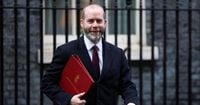In a bid to reshape its economic relationship with the United States, British Minister of Business and Trade Jonathan Reynolds expressed optimism on Tuesday that any tariffs imposed by President Donald Trump could be lifted if both nations can agree on the outlines of a new economic partnership. Speaking on April 1, 2025, Reynolds highlighted Britain's strategic efforts to avoid Trump's sweeping tariffs by proposing agreements in key sectors such as technology and artificial intelligence.
Reynolds noted that Trump appears intent on applying tariffs across the board before considering individual exemptions, a move that has raised concerns in London. "I hope that the tariffs the United States will announce tomorrow will be lifted once both sides reach the terms of the agreement," he stated during an interview with the BBC.
He further elaborated on the negotiations, asserting, "I believe that a framework for an agreement certainly exists... We can sign the main terms in this regard, then discuss the details concerning the specific timeline that will satisfy the United States afterward." This statement underscores the urgency and complexity of the discussions as both nations navigate the intricacies of trade relations.
British Prime Minister Keir Starmer weighed in on the situation, indicating that the talks are making "good progress." Unlike the European Union and other major countries, Britain has refrained from retaliating against U.S. tariffs, with Reynolds emphasizing that London aims to avoid escalation. He pointed out that British companies support this measured approach, which seeks to foster a cooperative atmosphere rather than a confrontational one.
However, Reynolds made it clear that there are red lines in the negotiations, particularly regarding sensitive topics that will not be part of the discussions, such as food standards. He expressed confidence that Britain has a better chance than other nations to secure an exemption from the tariffs. "I hope to conclude an agreement that would eliminate the tariffs within weeks or months," he shared, highlighting his commitment to achieving this goal.
Despite his optimism, Reynolds acknowledged the uncertainty surrounding the timeline for the U.S. to retract its tariffs. He cautioned that if the negotiations take longer than anticipated, Britain would consider imposing counter-tariffs as a means of protecting its economic interests. This potential escalation reflects the high stakes involved in the ongoing trade talks.
As the situation develops, the focus will remain on how both countries can navigate their differences while working toward a mutually beneficial agreement. The outcome of these negotiations could have significant implications for the future of U.S.-UK trade relations, especially in light of the ongoing global economic challenges.





